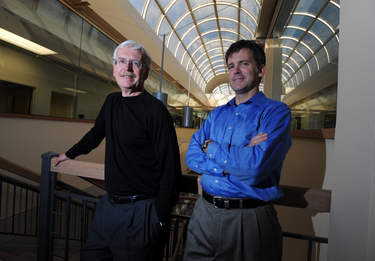University of Michigan's economic development strategy is focus of Obama cabinet member's visit
An Obama administration cabinet member this week will get a close look at the University of Michigan’s efforts to turn its research into economic activity, and local officials hope it leads to funding for economic development efforts in the Ann Arbor region.
U.S. Secretary of Commerce Gary Locke is visiting U-M on Tuesday for an invitation-only conference organized to discuss the university’s technology commercialization and business development.
“We’ve had some success here, so I think one of the reasons he’s coming is they’ve seen what we’ve demonstrated already,” said Ken Nisbet, executive director of U-M’s Office of Technology Transfer. “What I’m hoping to do is learn and provide examples of what we’ve done and learn from others.”

Ken Nisbet, left, executive director of the University of Michigan Tech Transfer, and Jim O'Connell, associate director of business formation, launched the Michigan Venture Center last year to help professors decide whether to start companies.
Nisbet added that he hopes that the Commerce Department identifies funding opportunities for U-M economic development initiatives.
Ann Arbor SPARK, the region’s economic development organization, also hopes to land more funding. Washtenaw County and SPARK recently collaborated to develop the region’s Community Economic Development Strategy, a document the Commerce Department uses to assess funding opportunities.
Elizabeth Parkinson, SPARK’s vice president of marketing and public relations, said SPARK hopes to land more federal dollars for various business development activities after Locke’s trip and a previous trip to Ann Arbor by Assistant Secretary of Commerce John Fernandez.
“All are very favorable signs that the Commerce Department is looking at our region for partnership opportunities, community opportunities, and they’re connecting with the right folks,” Parkinson said. “Our region is on their radar.”
The conference is one of four “innovation forums” the Obama administration is hosting throughout the country to discuss the role of universities in boosting the economy.
"U-M is privileged to be a host for this critical discussion, and our involvement reflects the increased role we are playing in galvanizing the regional economy," said Marvin Parnes, U-M associate vice president for research and executive director for research administration, in a statement.
“By sharing successes and challenges with Commerce officials and other regional leaders across all sectors, we have the opportunity to improve the way universities contribute to job creation and economic development."
The university, whose research budget topped $1 billion last year, is constantly seeking to form startup companies and license technology to existing businesses. U-M generated eight new startups and signed 78 licensing deals in the fiscal year ended June 30, 2009.
One of the company’s latest startups, Ann Arbor-based microprocessor firm Ambiq Micro, recently won a $250,000 business plan competition run by Cisco Systems and venture capital firm Draper Fisher Jurvetson.
Locally based U-M startups include successful established firms like HealthMedia, which was acquired in 2008 by Johnson & Johnson, and HandyLab, which was acquired by Becton, Dickinson and Co. in 2009.
Several initiatives launched within the last few years have broadened the university’s focus on boosting the local economy:
--U-M plans to use the 174-acre North Campus Research Complex - the ex-Pfizer campus acquired for $108 million in 2009 - in part to give its professors incubator space for new companies. The university also plans to conduct multi-disciplinary research at the site in hopes of achieving major technological advances.
“That’s going to give us more flexibility and opportunity to pool people together where we didn’t have available space now,” Nisbet said.
--The Tech Transfer Office last year created the Michigan Venture Center specifically to provide resources for faculty members weighing whether to pursue a startup company. “We want to expand it,” Nisbet said.
The Tech Transfer Office also offers a mentor-in-residence program to offer on-the-job training for entrepreneurs as well as a “gap capital” program to deliver small-scale funding to professors who can’t get it elsewhere.
--The university formed the Business Engagement Center in 2008 to hasten the interaction of outside companies with professors and others within the university.
--The university created the Medical Innovation Center a few years ago to bring together experts in various fields to commercialize new medical devices. One of the first outgrowths of the effort was Tangent Medical Technologies, which has secured $750,000 in private funding to pursue its new intravenous drug delivery device.
The university’s decision to get more involved in the local economy over the last 15 years is a sharp reversal from an atmosphere suspicious of business.
U-M President Mary Sue Coleman, widely credited for pushing the change, often says that professors’ motto should be “partner or perish,” not “publish or perish.”
Parkinson said the university’s role in boosting the local economy “almost cannot be verbalized.”
“We see the university’s fingerprints on nearly every project that we work on,” Parkinson said.
Contact AnnArbor.com's Nathan Bomey at (734) 623-2587 or nathanbomey@annarbor.com. You can also follow him on Twitter or subscribe to AnnArbor.com's newsletters.e


Comments
xmo
Sun, Jul 11, 2010 : 9:31 a.m.
I am so glad that President Obama is "PRO business" and that U.S. Secretary of Commerce Gary Locke is visiting U of M.